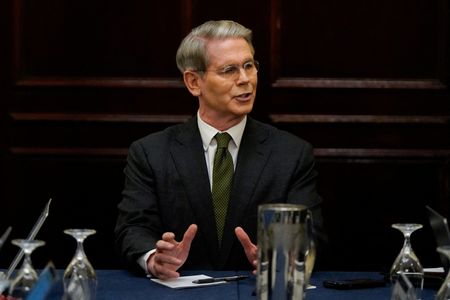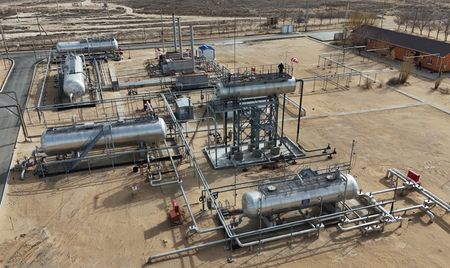By Georgina McCartney
HOUSTON (Reuters) -Oil prices fell almost 2% on Wednesday as sources said OPEC+ could accelerate its oil output increases next month, but losses were curbed after a report that U.S. President Donald Trump may cut tariffs on Chinese imports.
Brent crude futures were down $1.14, or 1.69%, at $66.30 by 10:39 a.m. EDT (1439 GMT) while U.S. West Texas Intermediate crude lost $1.17, or 1.84%, to $62.50.
Brent had traded at $68.65 a barrel earlier in the session, its highest since April 4.
Several OPEC+ members will suggest that the group accelerate oil output increases for a second consecutive month in June, three sources familiar with OPEC+ talks told Reuters.
The decision comes against a backdrop of a dispute among members over compliance with production quotas.
Both benchmarks fell more than $2 after the news.
Meanwhile, Kazakhstan’s new energy minister told Reuters his country will prioritise national interests over those of the OPEC+ producer group when deciding its oil output levels.
Kazakhstan has angered other OPEC+ members by producing more than its allotted quota.
U.S. crude stocks rose while gasoline and distillate inventories posted larger-than-expected draws last week, the Energy Information Administration said on Wednesday.
Crude inventories rose by 244,000 barrels to 443.1 million barrels in the week ended April 18, the EIA said, compared with analysts’ expectations in a Reuters poll for a 770,000-barrel draw.
Providing a floor to prices, the U.S. government is considering cutting its tariffs on Chinese imports to de-escalate tensions with Beijing, the Wall Street Journal reported on Wednesday.
The China tariffs are likely to come down to between 50% and 65%, the report added, citing a White House official.
The U.S. issued new sanctions targeting an Iranian shipping magnate whose network handles Iranian liquefied petroleum gas and crude oil worth hundreds of millions of dollars.
Trump has backed away from the threat of firing Federal Reserve Chair Jerome Powell after days of criticising the Fed for not cutting interest rates, easing investor fears about economic uncertainty.
(Reporting by Georgina McCartney in Houston, Shadia NasrallaAdditional reporting by Robert Harvey in London, Jeslyn Lerh in SingaporeEditing by Louise Heavens, David Goodman and Rod Nickel)











